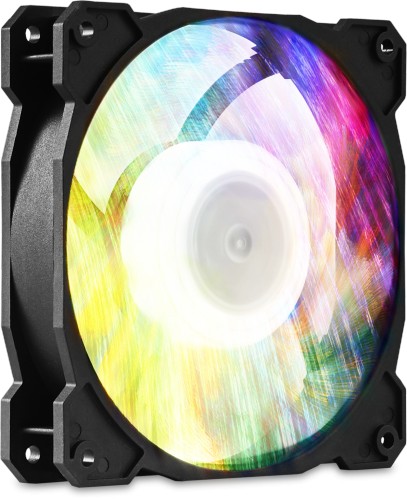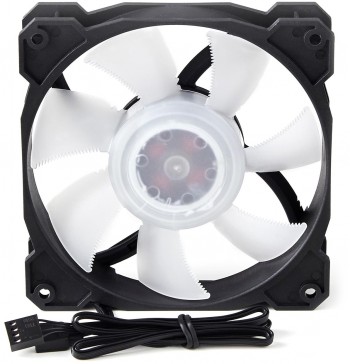Radiant-D 120mm Extreme Performance Programmable Digital-RGB PWM Fan NZ$ 21.28 67 in stock | |
| More variations available Show | |
Gelid Solutions Radiant-D 120mm Extreme Performance Programmable Digital-RGB PWM Fan
Gelid’s Radiant-D is an addressable RGB fan, giving you total control over how the RGB LEDs work! With exceptional performance and a bold design the Radiant fans are perfect for virtually all scenarios!
Features
- 9 Full Colour RGB LEDs
- Programmable Digital-RGB Control
- Extreme Static Pressure
- High Precision Shark-Tooth Blade
- Noiseless Motor Drive IC
- Ultra-Durable Double Ball Bearing
- CFM 77.2, 40.4 dBA Max, 500-2000 RPM
Brewed with top technologies and passion, the Radiant-D RGB LED Fan is a special craft for modders and gaming enthusiasts. It adds programmable Digital-RGB control with individually addressable LEDs that enables variable colour settings for each of the 9 LEDs installed to the fan and fosters a stunningly vivid RGB LED lighting experience. Along with the extreme performance profile and bold design, all that makes the Radiant-D a perfect ingredient for gaming rigs and custom PCs. Just try it, ignite full colours of life inside your PC!
9 Full Colour RGB LEDs - circularly mounted high-bright LEDs for a stunningly vivid RGB Lighting experience. Programmable Digital-RGB Control - limitless colour modes and lighting effects via individually addressable RGB LEDs. Extreme Static Pressure - powerful impeller with the unprecedented static pressure and performance profile. High Precision Shark-Tooth Blade - 3D optimised blade for even higher airflow and lesser noise. Noiseless Motor Drive IC - newly designed and enhanced motor driver to eliminate clicking noise. Ultra-Durable Double Ball Bearing - carefully selected top-quality ball bearings for ultra-durable operation. Wide Range RPM - extended fan speed in the range 500 – 2000 RPM. Broad Compatibility - all modern motherboards with RGB Lighting controls and 5V Addressable headers are supported.
STANDARD RGB AND INDIVIDUALLY ADDRESSABLE RGB EXPLAINED
In standard RGB applications, this type of fans uses the standard RGB LED header with 4-wiring: 12V, R, G, B. All the LEDs integrated with the fan are then connected onto the same 4 busses, they are all controlled as a whole, so they each will output exactly the same colour.
It’s like you set colour for an object in your graphics editor, for example, Red: 25, Green: 50 and Blue: 125, an external RGB controller or motherboard drives the standard RGB LED fan in the same way by altering power on the colour busses at a proper duty cycle – the Red, Green and Blue bus, respectively – to output the desired RGB colour.
Of course, colours can be managed dynamically, with numerous lighting effects in series. But uniformity of the LEDs – one colour for all the LEDs at a time – limits RGB lighting effects to some degree.
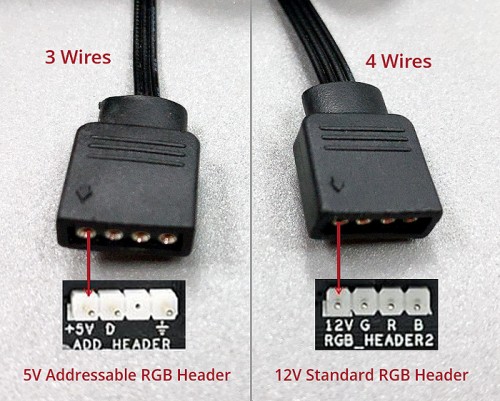
RGB Fan Headers
Radiant-D Individually Addressable RGB
Unlike the standard RGB fans, controls of the individually addressable RGB fans are digital in nature. For this case, the fans use the addressable RGB LED header with 3-wiring: 5V, D, Ground. And the LEDs integrated with the fan have a special companion IC which drives each of them individually: it resides on a one-wire serial bus and sends commands like “LEDs number 3, 5 and 6: switch to green” to set the desired colour per individual LED. So, each of the LEDs has its own ID and is controlled independently from the others. In turn, an external app can be used to program the IC giving virtually unlimited options of colour modes and effects. Rainbow-circle, rotating colours, multipoint pulsating colours and some other stunningly vivid RGB lighting effects are available only with the individually addressable RGB fans. But, as far as this type of fans supports digital RGB controls only, it’s up to your motherboard to provide a full-featured RGB app to discover the excellence of RGB lighting.
Please refer to your motherboard manual before connecting the individually addressable RGB fans.
Below is a short 15 second video to show you the Radiant-D in action!
| Specifications | Radiant-D 120mm |
|---|---|
| Model number | FN-RADIANTD-20 |
| Size | 120x120x25 mm |
| Airflow | 77.2 CFM |
| Bearing | Double Ball Bearing |
| Cable Length (mm) | 500 (PWM & RGB) |
| Power Draw (W) | |
| Voltage | 12 V |
| Fan Life Time MTTF at 40C (h) | |
| Rotational Speed (±10%) | 2000 RPM |
| Min Rotational Speed (±10%) | 500 RPM |
| Noise Level | 40.4 dBA |
| Static pressure | 3.39 mm H₂O |
| Connector | 4-pin PWM |
| RGB | Yes |
| RGB Voltage | 5V * |
| LED Connector | 4-Pin Addressable RGB Header (5V) |
| Weight (g) | 188 |
| Included | 4 Screws |
| Warranty | 24 months |
| EAN barcode | 4897025781955 |
- *Caution: the RGB cable can support connection to Addressable RGB (5V) header only. Please refer to your mainboard installation manual for details. Plugging into the standard RGB Header (12V) may damage the fan!
| Specifications | Radiant-D 120mm |
|---|---|
| Model number | FN-RADIANTD-20 |
| Size | 120x120x25 mm |
| Airflow | 77.2 CFM |
| Bearing | Double Ball Bearing |
| Cable Length (mm) | 500 (PWM & RGB) |
| Power Draw (W) | |
| Voltage | 12 V |
| Fan Life Time MTTF at 40C (h) | |
| Rotational Speed (±10%) | 2000 RPM |
| Min Rotational Speed (±10%) | 500 RPM |
| Noise Level | 40.4 dBA |
| Static pressure | 3.39 mm H₂O |
| Connector | 4-pin PWM |
| RGB | Yes |
| RGB Voltage | 5V * |
| LED Connector | 4-Pin Addressable RGB Header (5V) |
| Weight (g) | 188 |
| Included | 4 Screws |
| Warranty | 24 months |
| EAN barcode | 4897025781955 |
- *Caution: the RGB cable can support connection to Addressable RGB (5V) header only. Please refer to your mainboard installation manual for details. Plugging into the standard RGB Header (12V) may damage the fan!
Product Resources
FAQ
How do I measure fan size?
The size of fan you need will generally be determined by the size of the fan fitting position in your PC case. The sizes of all the fans on our website are shown as measured along any one of the fan’s four sides, NOT the distance between the fan’s screw holes! Our most popular fan size is 120mm, followed by 80mm. This isn’t really dictated by customer preference, but more by recent designs of PC cases.
As for the thickness (depth) of the fan, generally 25mm (1 inch) is by far the most common depth, although smaller fans can have shallower depths such as 15mm or even 10mm. All our fans are 25mm thick unless otherwise stated. If you have any questions about which fan you should order, please don’t hesitate to get in touch.
If you know the distance between the fan mounting screw holes but don’t know what fan size to order, please see the following table. Note that the mounting hole measurements shown below are taken horizontally or vertically between the holes and not diagonally.
Screw hole spacings and fan sizes
Space Between Screw Holes Fan Size 32mm 40mm 40mm 50mm 50mm 60mm 60mm 70mm 72mm 80mm 83mm 92mm 105mm 120mm I received a small cable (resistor) with my fan; what is it for?
The resistor cable (also called Ultra Low Noise or ULN cable) is designed to allow the fan to run slightly slower for even quieter operation. The benefit in lower running noise is significant. Although the airflow will be reduced slightly, this usually has minimal effect on PC temperature. We would generally recommend using the ULN resistor cable for best results in almost all circumstances.
How can I tell which way the air blows through the fan?
Hold the fan so that the round fan sticker is facing you. You are looking at the rear of the fan. When you plug the fan in, the air will be blowing towards you. If you want a fan to act as an air intake, then the fan sticker will be facing the inside of the case. Some fans also have two small arrows moulded into their plastic housing - one arrow shows the direction of airflow, and the other (at 90°) shows the direction of blade rotation.
Is it possible to use a 4-pin PWM fan or CPU cooler with a motherboard which has only 3-pin fan headers on it?
Electrically, there is no problem doing this - the fourth pin on the fan cable is used purely for PWM control and is not needed in order for the fan to run. So you can plug the 4-pin fan connector onto the 3-pin motherboard fan header, leaving the fourth pin not connected to anything. The fan will potentially run at full speed, so if you would like to reduce the speed of the fan you will need to adjust the fan speed setting in your BIOS or use fan control software such as SpeedFan in Windows.
The only other problem to consider is that occasionally, components immediately adjacent to the motherboard fan header can get in the way of the larger 4-pin fan connector, physically preventing connection. This problem also occurs if you try to use an in-line fan speed controller such as the one made by Gelid.
Another avenue to explore is the possibility of using a bay-mounted fan controller. Several models are available now which provide 4-pin fan headers, so this is an easy way to use 4-pin PWM fans in a PC system which has only 3-pin fan headers on its motherboards. When using this method, you may find it necessary to disable any fan warning settings in your motherboard BIOS, since the motherboard may incorrectly believe that its CPU fan has failed when the fan is connected to a fan controller rather than directly to the motherboard itself.
Top Quiet Fans

Noctua NF-A20 PWM 5V 800RPM 200x30mm Extra Large Quiet Fan

Noctua NF-A12x25 PWM chromax.black.swap 12V 2000RPM 120mm Fan

Noctua NF-S12B REDUX 12V 700RPM 120mm Quiet Case Fan

Noctua NF-A6x25 PWM 12V 3000RPM 60x25mm Low Noise Fan
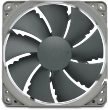
Noctua NF-P12 REDUX PWM 12V 1700RPM 120mm Quiet Case Fan

Noctua NF-A12x15 PWM chromax.black.swap 12V 1850RPM 120x15mm Fan

Noctua NF-A14 PWM chromax.black.swap 12V 1500RPM 140mm Fan

Noctua NF-F12 iPPC PWM 12V 3000RPM 120mm High Performance Fan

Noctua NF-A14 PWM 12V 1500RPM 140mm Premium Quality Fan
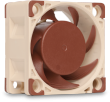
Noctua NF-A4x20 PWM 12V 5000RPM 40x20mm Quiet Cooling Fan

